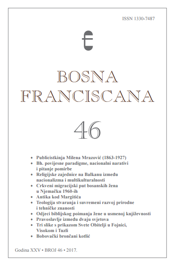Bosansko-hercegovačke povijesne paradigme, nacionalni narativi i pitanje pomirbe
Bosnian-Herzegovinian Historical Paradigms, National Narratives and Issue of Reconciliation
Author(s): Srećko M. DžajaSubject(s): Middle Ages, Modern Age, Recent History (1900 till today), Theology and Religion, Demography and human biology, Nationalism Studies, Sociology of Religion
Published by: Franjevačka teologija Sarajevo
Keywords: bogomilism; Bosnian Church; demographic changes; islamization; confessionalism; folk and high culture; national ideologies; yugoslavistic and serbocroatistic paradigm; left and right totalitarianism;
Summary/Abstract: The approach to the history of Bosnia and Herzegovina is unanimous only when it refers to the issue of definition of periods Bosnian-Herzegovinian history, divided in the Medieval Bosnia, Ottoman period, Austro-Hungarian period and period of two Yugoslav states with interruption of so called Independent State of Croatia during World War II. Each of these periods presents paradigm for itself, which in historical narratives of three nationalities – Bosniaks, Croats and Serbs – has different, mutually often disparate characteristics and interpretations. Medieval Bosnia offers exceptionally disparate answers by some narratives to the issues of theological character and social role of Bosnian Church and religious affiliation of Medieval Bosnian rulers and regional masters. The continuity and discontinuity between the Medieval Bosnia and Ottoman period is also questionable. Varying answers are provided to the question of (dis)continuity between medieval and Ottoman political institutions and the problem of the demographic changes occurred in the period of the Ottoman paradigm, particularly considering immigrations and emigrations from Bosnia and Herzegovina, and Islamization of BH people. The transition of Ottoman period into the Austro-Hungarian period has developed the question of modern secularism, i. e. conversion of Ottoman confessional paradigm into the modern national paradigm within BH society. For this question alike, the national narratives of Bosniaks Croats and Serbs provide different answers, supported by different arguments. Two phases of Yugoslav period – monarchist (nationalistic) and socialist (communistic) – tried to prevail the inherited social paradigm – confessional dating back to Austro-Hungarian rule by assimilationist ideologies, in the first case by ideology of large Serbia or by integrationist Yugoslavia, to the lower extent even with large Croatia, and in the other case by formal recognition of BH nationalities and their conversation in integrating socialist society compliant with rules of communist utopia. This paper tries to present shortly these different historical routes, underline their political objectives and ideological premises , and face them with results of current historiography about BH, thus opening the space to prevent the historical misstatements and acceptance of historical truth as unavoidable precondition for mutual reconciliation. In Bosnian and Herzegovinian area, the members of all tree nationalities are burdened and traumatized by different historical facts and notions about them, which complicate their cohabitation. The ways to catharsis and modern political cohabitation leads through the truth. Only the truth shall make us free and capable for cultural and political cooperation, practically for cohabitation. There is no third way!
Journal: Bosna Franciscana
- Issue Year: 2017
- Issue No: 46
- Page Range: 55-76
- Page Count: 22
- Language: Croatian
- Content File-PDF

